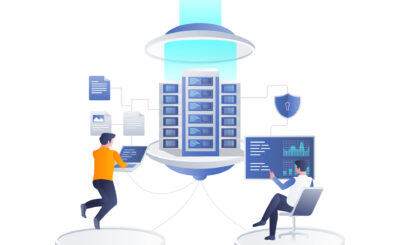Modi govt best chance to create next TCS and Infosys:2023
In today’s digital world, data has become the new oil as the availability of the internet has massively spread across Modi’s country in recent years. It has exposed people to a variety of benefits of a connected environment, from faster communication to more accessible access to services. Government ambition and drive towards a digital economy has also accelerated this spread. Every part of daily life, from banking to education to retail, generates massive amounts of data.
As a result of this Internet explosion, data center sizes have grown from rooms to commercial towers, allowing more storage space to be housed. This is where the importance of a robust data center comes into play. A data center is a specialized, secure space in a centrally located building that houses computer and networking equipment to collect, store, process, distribute, or provide access to large amounts of data. In addition to storage, modern data center hubs have become an essential part of IT infrastructure. Any failure in a data center can lead to a huge loss for an organization and the government. It is critical to provide end-to-end data center management by breaking down barriers between IT and facilities and managing interdependencies. According to an analysis by Statista, the Indian data center industry is expected to grow at a CAGR of 11.4% between 2022 and 2027. This is mainly due to the growing demand for data storage in the IT, telecom and BFSI, as well as multinational companies. IT giants with operations in India. The data center remains an essential part of the IT industry. With the advancement of technology, numerous developments in the future of the data center are expected to contribute to the creation of IT jobs and the globalization of the country becoming a hub for all.
India: the global hub for data centers
India is fast becoming the largest and fastest growing digital consumer market in the world. It has undergone considerable changes in recent years. India’s digital economy is expected to be worth $1 trillion by 2025, according to the Ministry of Electronics and IT Industry. India is well positioned to be a major data center hub due to its economic cost advantage, availability of skilled labor, minimal climate risk, stable government and robust data protection legislation. Major global data center operators, cloud service providers, hyperscalers, private equity investors and developers have all invested in the country. Additionally, the government’s recent decision to recognize the status of data center infrastructure will provide access to long-term institutional capital and stimulate future expansion investments in the sector. It will also significantly boost the country’s rapidly developing digital infrastructure.
The adoption of cloud computing and digital transformation by Indian businesses has increased the demand for data center services. The number of data-intensive technologies (such as Big Data and the Internet of Things) is growing rapidly. This implies that there is a much greater need for data storage, which is fueling the growth of the data center industry in India. According to expert estimates, India now has about 132 data centers spread across the country. Furthermore, the many government initiatives and reforms aimed at transforming India into a global data center have provided the essential steps to make this expansion a reality, and more new companies may join us in the coming years. So let’s dive into the details of how the government intends to position India as a leader in the data center industry.
The role of government in transforming India into a data center
Many rapid changes enacted by the government under the Digital India program in recent years have made India one of the fastest growing major economies in the world. Citizen-centric digital programs of Indian government such as E-Aadhaar, Digi Locker, Crime and Criminal Tracking Network and Systems (CCTNS), e-Courts, GSTN and others generate huge amounts of data.

Increase in online payment systems
The government is trying to encourage consumers to use online payment systems for all financial transactions. This requires the construction of multiple data centers to house all the generated data. Over the past five years, the volume of digital payments in India has grown by more than 50% per year. That’s one of the most incredible growth rates in the world, but it’s been much faster, at about 160 percent per year, in India’s unique real-time mobile system, Unified Payments Interface (UPI). Thus, when the Unified Payment Interface (UPI) was first introduced in April 2016, only 21 banks had signed up. And according to RBI, as of June 2022, the number of participating banks has increased by 44% to 300 banks.
Modi’s Data Protection Act
The government’s planned data protection law for 2021 encourages data localization, which requires a mirror copy of sensitive personal data (SPD) and critical personal data (CPD) currently available from foreign companies to be delivered to India on time. The new version of the data protection law will deal with both personal and digital data and impose penalties for any violations. The law will enable coordinated efforts on several fronts including 5G rollout, infrastructure development and regulatory changes, and help build a bigger and stronger digital ecosystem in India. As a result, the need for a data storage hub will increase as businesses become more aware of the laws that protect their data every step of the way.
More investments
Finance Minister Nirmala Sitharaman has unveiled new trends and investments to propel the sector to new heights during the 2022 annual Modi’s budget. New tax breaks and grants in MODI Budget 2023 will encourage more businesses to invest in data centers. By naming data centers in the sector, the government can also meet the growing demand for the Internet.
To achieve the intended result, the Modi government should increase investment in a variety of initiatives, including research and development of new technologies and solutions, improving infrastructure and link connectivity, to attract more businesses and create more job opportunities.
Furthermore, the government can also spend more on cybersecurity. This would help data center hubs ensure the privacy and security of all data. Additionally, to help with operations and expansion, the government can also improve access to finance for data center companies.
Both the states and the union government can play a key role in expanding the Indian data center market into a global hub. In addition, the state government can also develop its own data center rules and make some changes to the current rules to encourage investment in data centers and infrastructure.
Moving forward: It’s now or never!
In short, the future of the data center industry in India is bright. The presence of large hyperscalers who have started outsourcing their storage needs to external data center operators is driving the Indian data center market. Currently, Indian business tycoons, international investors and the government are investing and launching innovative strategies to support the growth of the industry. According to JLL, India’s DC sector is expected to more than double from its current capacity of 447MW to 1007MW by 2023. As a result, the entire effort would undoubtedly prepare India and the would help become a global data center powerhouse.






